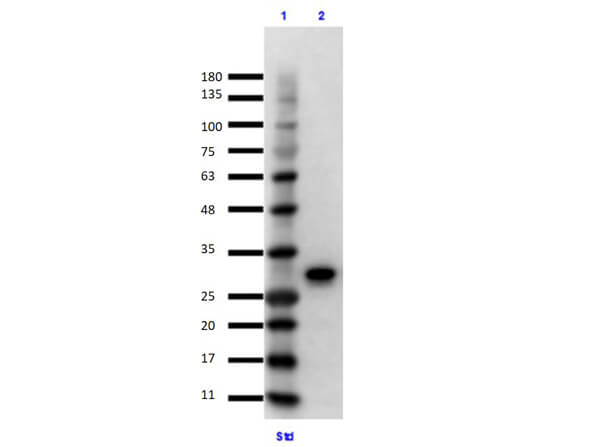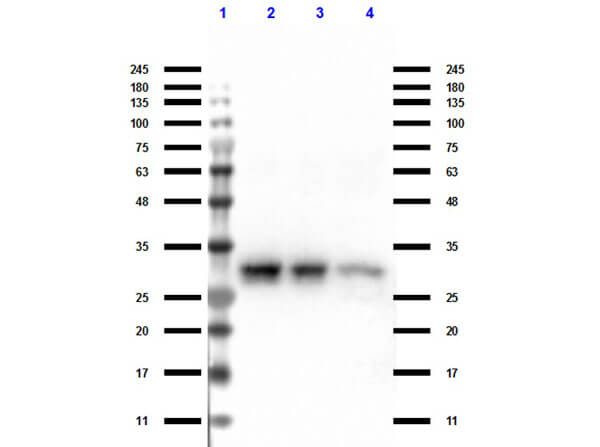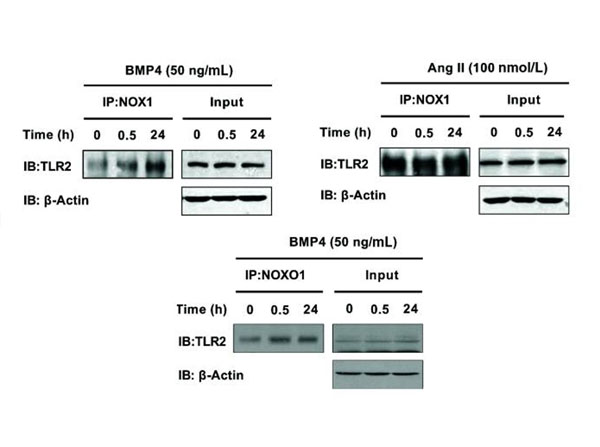TrueBlot® Anti-Rabbit IgG Magnetic Beads
Goat Polyclonal
$50.00 to US & $70.00 to Canada for most products. Final costs are calculated at checkout.
Product Details
Target Details
Application Details
Formulation
Shipping & Handling
What is Rockland’s TrueBlot® product line?
Rockland’s TrueBlot® product line is designed to solve common experimental problems when performing immunoprecipitation/co-immunoprecipitation experiments and Western blots of immunoprecipitated samples (IP–Western blot). The product line consists of TrueBlot® monoclonal secondary antibodies and TrueBlot® IP beads.
What is the advantage of TrueBlot® secondaries over regular secondary antibodies?
TrueBlot® antibodies are specific to the whole IgG molecule and will not bind heavy or light chains. This is useful for binding target proteins with an expected MW near 25 kDa (light chains) and 50 kDa (heavy chains).
Why does it appear that the TrueBlot® antibody is binding heavy/light chains in my sample?
The sample must be fully reduced to eliminate cross-reactivity with heavy and light chains. Any reactivity to heavy and light chains could be due to incomplete reduction of your sample. Please be sure to optimize reducing conditions for your sample type.
How can I ensure my samples are fully reduced?
Samples can be fully reduced by heating at 90-100°C for 10 minutes in sample buffer containing reducing agent (for example, DTT to a final concentration of 50 mM or add β-Mercaptoethanol to a final concentration of 2% (v/v)).
With which species/isotypes are TrueBlot® secondary antibodies reactive?
TrueBlot® secondary antibodies are reactive with the IgG of their respective species. For example, if using a primary antibody raised in mouse (mouse host), use TrueBlot® anti-mouse Ig secondary antibodies for detection.
Do TrueBlot® secondary antibodies detect IgM?
TrueBlot® secondary antibodies have not been shown to detect IgM.
Do I need to preclear my lysate before the immunoprecipitation step?
Samples that have many other proteins present (such as lysates) may require preclearing to prevent interference in later IP and WB procedures. Recombinant protein samples require pre-clearing more often than serum samples.
How can I enrich/concentrate my lysate for a low expression of a protein of interest?
The immunoprecipitation procedure can be repeated several times to yield a more concentrated protein solution.
What is the recommended lysis buffer for TrueBlot® products?
The optimal lysis buffer will depend on your sample type. See protocol for buffer recommendations. Generally, 1X RIPA is used to lyse samples.
My target protein has the same MW as a heavy/light chain. How can I be sure that the band is the target protein and not a heavy/light chain?
Be sure to include a positive control for the primary antibody in your experiment and check that the sample is fully reduced.
What is the average size of TrueBlot® magnetic/agarose beads?
The beads are roughly 0.5 μm in diameter.
Why can’t I use Protein A or Protein G beads for the IP step in IP–Western blot when using rabbit species?
Using Protein A or Protein G beads with rabbit species results in contaminated bands. For best results when using rabbit species, use Rockland’s TrueBlot® Rabbit Ig IP beads, which are available in either a magnetic or agarose format. Please see individual TrueBlot® Rabbit product pages for additional details.
Can I use Protein A or Protein G beads for the IP step in IP–Western blot when using mouse, goat, or sheep species?
Yes. If you are using Protein A or Protein G beads with mouse, goat, or sheep species, we recommend the following: Determine the compatibility of Protein A or Protein G with your species and subtype, do not use excessive amounts of slurry, and choose the appropriate elution conditions. In some instances, harsher elution conditions can cause stripping of the subunits of Protein A or Protein G from the bead support and result in non-specific bands. For best results, we recommend using TrueBlot® Ig IP beads, which are available in either agarose or magnetic format.



